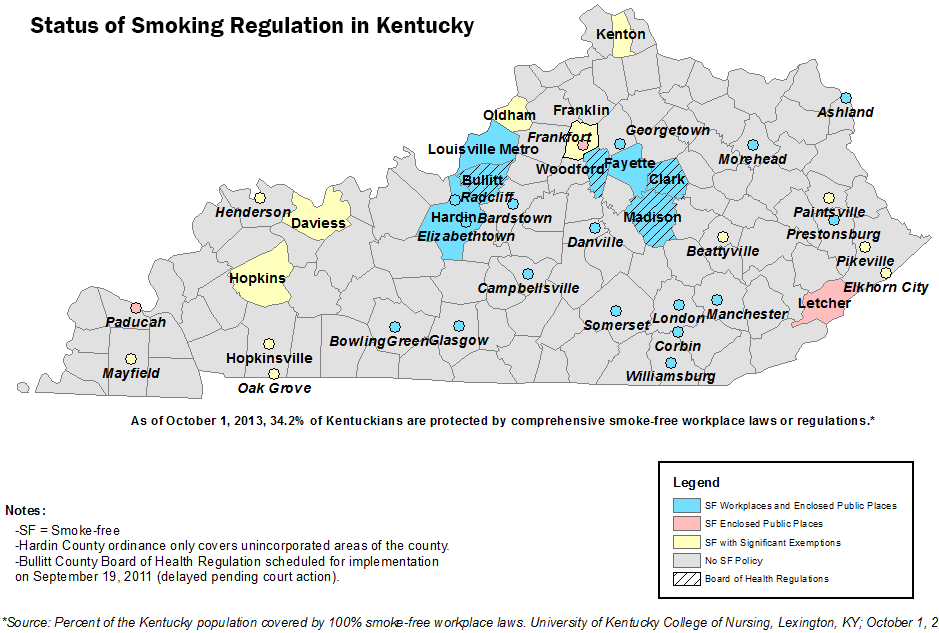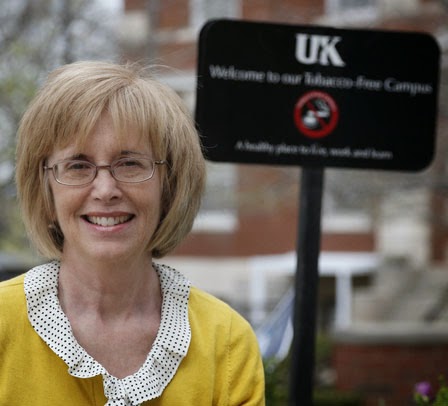Health News
People who live in smoke-free communities are less likely to be hospitalized for emphysema, according to a study by the University of Kentucky's College of Nursing and College of Public Health and recently published in the American Journal of Public Health.
The study found that people who live in communities with comprehensive smoke-free workplace laws are 22 percent less likely to be hospitalized for chronic obstructive pulmonary disease (COPD), or emphysema. Living in a community with an established law also resulted in a 21 percent lower likelihood of experiencing hospitalization due to emphysema.
Kentucky has the nation's highest rate of chronic obstructive pulmonary disease, 9.3 percent of the population, according to the federal Centers for Disease Control and Prevention. Tobacco use is the primary cause of emphysema, but air pollution and genetics can also play a role.
The study matched 2003 and 2001 data on hospital discharges with communities that were part of the Smoke-free Ordinance database from the Kentucky Center for Smoke-free Policy, Ann Blackford reports for UKnow.
?Smoke-free public policies, particularly when they cover all workplaces with no exceptions and have been in place for at least one year, may provide protection against exacerbation of COPD that lead to hospitalizations, with potential to save lives and decrease health care costs,? said Nursing Professor Ellen J. Hahn, director of the center and lead author of the study. ?Given that such a high percentage of Kentuckians live in at-risk rural areas and lack the protective factor of income or smoke-free laws, the state faces a higher risk of COPD."
Lexington was the first Kentucky city to pass a smoking ban. "Lexington's smoking ordinance, which bans smoking in most indoor public spaces, doesn't specify that smokers be caught in the act. But that has become the default standard since the ban went into effect 10 years ago," Mary Meehan reports for the Lexington Herald-Leader. "As the smoking ban in Lexington has aged, the challenges have lessened. In many cases, Hahn said, the ban has been self-enforcing. Patrons at restaurants complain to management about smokers, or bar employees take it upon themselves to keep people from lighting up. Gradually, she said, smoking just isn't accepted or expected anymore. Non-smoking in most places has become the 'new normal.' There are now only a handful of businesses that receive citations. Most are small bars and strip clubs."
Read more here: http://www.kentucky.com/2014/04/26/3214347/10-years-after-it-became-law-fayette.html#storylink=cpy
- New Test Developed By Top Expert At Uk Will Lead To Earlier Diagnosis Of Copd, In Which Kentucky Leads The Nation
A University of Kentucky professor helped develop a new tool to diagnose chronic obstructive pulmonary disease, which is often diagnosed late and is more prevalent in Kentucky than anywhere else in the nation, Laura Joszt reports for The American Journal...
- Supporters Of Smoking Bans Fear Letter From Ky. Association Of Counties Will Halt Local Efforts To Pass Such Measures
An insurer's letter has warned counties that they may face rate increases if they are sued about local ordinances, including those against smoking. According to a legal consultant to the Kentucky Center for Smoke-free Policy, the letter...
- Tobacco Heritage Blocks Smoking Bans In Rural Kentucky
"A mural showing a tobacco harvest has been on display high in the second-floor rotunda of the Bourbon County Courthouse for than 100 years," Mary Meehan writes. (Herald-Leader photo) Bourbon County's strong tobacco heritage is the...
- 10 Years Ago, Lexington's Smoking Ban Started Creating A Healthier City And A Movement Among Others In Kentucky
A decade ago, Lexington took a bold step by enacted the state's first public smoking ban, in a city that once proudly touted its status as the "World's largest burley tobacco market." As smoke-free supporters and Lexington residents celebrate...
- Statewide Smoking Ban Proposed In Legislature
State Rep. Susan Westrom of Lexington, left, announced her intent to file a bill today that calls for a statewide smoking ban, which would prohibit cigarette use in workplaces, restaurants, bars and private clubs. The Courier-Journal's Laura Ungar...
Health News
Ky. leads U.S. in emphysema (COPD), but study shows fewer COPD hospitalizations in Ky. places with smoke-free laws
 |
| Click on image for larger version |
The study found that people who live in communities with comprehensive smoke-free workplace laws are 22 percent less likely to be hospitalized for chronic obstructive pulmonary disease (COPD), or emphysema. Living in a community with an established law also resulted in a 21 percent lower likelihood of experiencing hospitalization due to emphysema.
Kentucky has the nation's highest rate of chronic obstructive pulmonary disease, 9.3 percent of the population, according to the federal Centers for Disease Control and Prevention. Tobacco use is the primary cause of emphysema, but air pollution and genetics can also play a role.
The study matched 2003 and 2001 data on hospital discharges with communities that were part of the Smoke-free Ordinance database from the Kentucky Center for Smoke-free Policy, Ann Blackford reports for UKnow.
 |
| Dr. Ellen Hahn (Herald-Leader photo by Matt Goins) |
Lexington was the first Kentucky city to pass a smoking ban. "Lexington's smoking ordinance, which bans smoking in most indoor public spaces, doesn't specify that smokers be caught in the act. But that has become the default standard since the ban went into effect 10 years ago," Mary Meehan reports for the Lexington Herald-Leader. "As the smoking ban in Lexington has aged, the challenges have lessened. In many cases, Hahn said, the ban has been self-enforcing. Patrons at restaurants complain to management about smokers, or bar employees take it upon themselves to keep people from lighting up. Gradually, she said, smoking just isn't accepted or expected anymore. Non-smoking in most places has become the 'new normal.' There are now only a handful of businesses that receive citations. Most are small bars and strip clubs."
Read more here: http://www.kentucky.com/2014/04/26/3214347/10-years-after-it-became-law-fayette.html#storylink=cpy
Read more here: http://www.kentucky.com/2014/04/26/3214347/10-years-after-it-became-law-fayette.html#storylink=cpy
- New Test Developed By Top Expert At Uk Will Lead To Earlier Diagnosis Of Copd, In Which Kentucky Leads The Nation
A University of Kentucky professor helped develop a new tool to diagnose chronic obstructive pulmonary disease, which is often diagnosed late and is more prevalent in Kentucky than anywhere else in the nation, Laura Joszt reports for The American Journal...
- Supporters Of Smoking Bans Fear Letter From Ky. Association Of Counties Will Halt Local Efforts To Pass Such Measures
An insurer's letter has warned counties that they may face rate increases if they are sued about local ordinances, including those against smoking. According to a legal consultant to the Kentucky Center for Smoke-free Policy, the letter...
- Tobacco Heritage Blocks Smoking Bans In Rural Kentucky
"A mural showing a tobacco harvest has been on display high in the second-floor rotunda of the Bourbon County Courthouse for than 100 years," Mary Meehan writes. (Herald-Leader photo) Bourbon County's strong tobacco heritage is the...
- 10 Years Ago, Lexington's Smoking Ban Started Creating A Healthier City And A Movement Among Others In Kentucky
A decade ago, Lexington took a bold step by enacted the state's first public smoking ban, in a city that once proudly touted its status as the "World's largest burley tobacco market." As smoke-free supporters and Lexington residents celebrate...
- Statewide Smoking Ban Proposed In Legislature
State Rep. Susan Westrom of Lexington, left, announced her intent to file a bill today that calls for a statewide smoking ban, which would prohibit cigarette use in workplaces, restaurants, bars and private clubs. The Courier-Journal's Laura Ungar...
